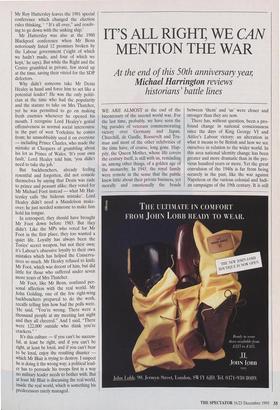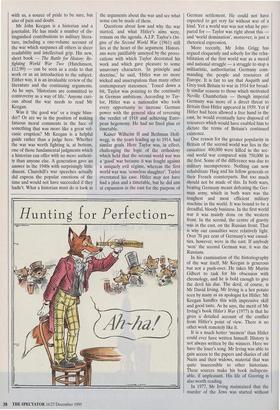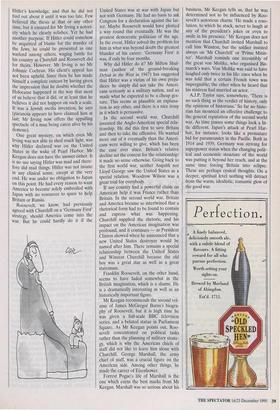IT'S ALL RIGHT, WE CAN
MENTION THE WAR
At the end of this 50th anniversary year; Michael Harrington reviews historians' battle lines WE ARE ALMOST at the end of the bicentenary of the second world war. For the last time, probably, we have seen the big parades of veterans commemorating victory over Germany and Japan. Churchill, de Gaulle, Roosevelt and Tru- man and most of the other celebrities of the time have, of course, long gone. Hap- pily, the Queen Mother, whose life covers the century itself, is still with us, reminding us, among other things, of a golden age of the monarchy. In 1945, the royal family were remote in the sense that the public knew little about their private business, yet morally and emotionally the bonds between 'them' and `us' were closer and stronger than they are now.
There has, without question, been a pro- found change in national consciousness since the days of King George VI and Attlee's Labour victory; an alteration in what it means to be British and how we see ourselves in relation to the wider world. In this area national identity change has been greater and more dramatic than in the pre- vious hundred years or more. Yet the great convulsion of the 1940s is far from being securely in the past, like the war against Napoleon or the various colonial and Indi- an campaigns of the 19th century. It is still with us, a source of pride to be sure, but also of pain and doubt.
Mr John Keegan is a historian and a journalist. He has made a number of dis- tinguished contributions to military litera- ture, including a one-volume account of the war which surpasses all others in sheer readability and intellectual grip. His new, short book — The Battle for History: Re- fighting World War Two (Hutchinson, £12.99) — can be seen as a coda to that work or as an introduction to the subject. Either way, it is an invaluable review of the literature and the continuing arguments. As he says, 'Historians are committed to controversy as a way of life.' Anyone curi- ous about the war needs to read Mr Keegan.
Was it 'the good war' or a tragic blun- der? Or are we in the position of making fatuous moral comments in the face of something that was more like a great vol- canic eruption? Mr Keegan is a helpful guide rather than a judge here. Whether the war was worth fighting is, at bottom, one of those fundamental judgments which a historian can offer with no more authori- ty than anyone else. A generation gave an answer in the 1940s with surprisingly little dissent. Churchill's war speeches actually did express the popular emotions of the time and would not have succeeded if they hadn't, What a historian must do is look at the arguments about the war and see what sense can be made of them.
Questions about how and why the war started, and what Hitler's aims were, remain on the agenda. A.J.P. Taylor's Ori- gins of the Second World War (1961) still lies at the heart of the argument. Histori- ans were justifiably annoyed by the provo- cations with which Taylor decorated his work and which gave pleasure to some unsavoury characters. 'In principle and doctrine,' he said, 'Hitler was no more wicked and unscrupulous than many other contemporary statesmen.' Toned down a bit, Taylor was pointing to the continuity in German ambitions. According to Tay- lor, Hitler was a nationalist who took every opportunity to increase German power with the general idea of reversing the verdict of 1918 and achieving Euro- pean hegemony. He had no fixed plan or timetable.
Kaiser Wilhelm II and Bethman Holl- wegg, in the years leading up to 1914, had similar goals. Here Taylor was, in effect, challenging the logic of the orthodoxy which held that the second world war was a 'good' war because it was fought against a uniquely evil regime, whereas the first world war was 'senseless slaughter'. Taylor overstated his case. Hitler may not have had a plan and a timetable, but he did aim at expansion in the east for the purpose of German settlement. He could not have expected to get very far without war of a kind. Yet a world war was not what he pre- pared for — Taylor was right about this and 'world domination', moreover, is just a rhetorical expression.
More recently, Mr John Grigg has argued eloquently and soberly for the reha- bilitation of the first world war as a moral and national struggle — a struggle to stop a militaristic, authoritarian Germany com- manding the people and resources of Europe. It is fair to say that Asquith and Grey took Britain to war in 1914 for broad- ly similar reasons to those which motivated Neville Chamberlain — though imperial Germany was more of a direct threat to Britain than Hitler appeared in 1939. Yet if Hitler had been allowed a free hand in the east, he would eventually have disposed of resources which would have enabled him to dictate the terms of Britain's continued existence.
One reason for the greater popularity in Britain of the second world war lies in the casualties: 400,000 were killed in the sec- ond world war compared with 750,000 in the first. Some of the difference was due to military incompetence. Nothing can now rehabilitate Haig and his fellow generals or their French counterparts. But too much should not be made of this. In both wars, beating Germany meant defeating the Ger- man army, which in both wars was the toughest and most efficient military machine in the world. It was bound to be a dreadful, bloody business. In the first world war it was mainly done on the western front. In the second, the centre of gravity was in the cast, on the Russian front. That is why our casualties were relatively light. Over 70 per cent of Germany's war casual- ties, however, were in the east. If anybody `won' the second German war, it was the Russians.
In his examination of the historiography of the war itself, Mr Keegan is generous but not a push-over. He takes Mr Martin Gilbert to task for his obsession with chronology, and he is bold enough to give the devil his due. The devil, of course, is Mr David Irving. Mr Irving is a hot potato seen by many as an apologist for Hitler. Mr Keegan handles this with impressive skill and good taste. As he says, the merit of Mr Irving's book Hitler's War (1977) is that he gives a detailed account of the conflict from Hitler's point of view. There is no other work remotely like it.
It is a much better 'memoir' than Hitler could ever have written himself. History is not always written by the winners. Here we have the loser's song. Mr Irving was able to gain access to the papers and diaries of old Nazis and their widows, material that was quite inaccessible to other historians. These sources make his book indispens- able, if unpleasant. His life of Goering is also worth reading.
In 1977, Mr Irving maintained that the murder of the Jews was started without Hitler's knowledge, and that he did not find out about it until it was too late. Few believed the thesis at that or any other time, but it ensured for Mr Irving a notori- ety which he clearly relishes. Yet he had another purpose. If Hitler could somehow be acquitted of blame for the murder of the Jews, he could be presented as one warlord among others, waging battle for his country as Churchill and Roosevelt did for theirs. However, Mr Irving is no Mr Johnnie Cochran. His client's appeal has not been upheld. Since then he has made himself a complete outcast by having given the impression that he doubts whether the Holocaust happened in the way that most of us believe that it did, or at least that he believes it did not happen on such a scale. It was a Jewish media invention, he says (paranoia appears to have claimed him at last; Mr Irving now offers the appalling spectacle of a man being eaten alive by his demons). One great mystery, on which even Mr Irving was not able to shed much light, was why Hitler declared war on the United States in the wake of Pearl Harbor. Mr Keegan does not have the answer either. It is no use saying Hitler was mad and there- fore did mad things. Hitler was not insane in any clinical sense, except at the very end. He was under no obligation to Japan on this point. He had every reason to want America to become solely embroiled with Japan with no resources to spare to help Britain or Russia.
Roosevelt, we know, had previously agreed with Churchill on a 'Germany First' strategy, should America come into the war. But he could hardly do it if the United States was at war with Japan but not with Germany. He had no basis to ask Congress for a declaration against the lat- ter. Maybe Roosevelt would have plotted a way round this eventually. He was the greatest democratic politician of the age. In the event, Hitler solved the problem for him in what was beyond doubt the greatest blunder of his career. 'Germany First' it was, if only by four months. Why did Hitler do it? Mr Milton Shul- man (author of the ground-breaking Defeat in the West in 1947) has suggested that Hitler was a victim of his own preju- dices: he simply did not take the Ameri- cans seriously as a military nation, and so made what he expected to be a cheap ges- ture. This seems as plausible an explana- tion as any other, and there is a nice irony in it which is persuasive.
In the second world war, Churchill invented the Anglo-American special rela- tionship. He did this first to save Britain and then to take the offensive. He wanted more out of it eventually than the Ameri- cans were willing to give, which has been the case ever since. Britain's relative decline set the context for the relationship: it made no sense otherwise. Going back to the first world war, neither Asquith nor Lloyd George saw the United States as a special relation. Woodrow Wilson was a great trial for everybody. If any country had a powerful claim on American help it was France rather than Britain. In the second world war, Britain and America became so intertwined that a rhetorical form had to be found to contain and express what was happening. Churchill supplied the rhetoric, and his impact on the American imagination was profound, and it continues — as President Clinton showed when he announced that a new United States destroyer would be named after him. There remains a special relationship between the United States and Winston Churchill because the old boy was a great star as well as a great statesman.
Franklin Roosevelt, on the other hand, seems to have faded somewhat in the British imagination, which is a shame. He is a dramatically interesting as well as an historically important figure.
Mr Keegan recommends the second vol- ume of James McGregor Burns's biogra- phy of Roosevelt, but it is high time he was given a full-scale BBC television series, and a belated statue in Parliament Square. As Mr Keegan points out, Roo- sevelt concentrated on political tasks rather than the planning of military strate- gy, which is why the American chiefs of staff did not like to leave him alone with Churchill. George Marshall, the army chief of staff, was a crucial figure on the American side. Among other things, he made the career of Eisenhower.
Forrest Pogue's life of Marshall is the one which earns the best marks from Mr Keegan. Marshall was so serious about his business, Mr Keegan tells us, that he was determined not to be influenced by Roo- sevelt's notorious charm: 'He made a reso- lution, to which he stuck, never to laugh at any of the president's jokes or even to smile in his presence.' Mr Keegan does not mention that Churchill invited Marshall to call him Winston, but the soldier insisted always on `Mr Churchill' or 'Prime Minis- ter'. Marshall reminds one irresistibly of the great von Moltke, who organised Bis- marck's wars. Von Moltke was said to have laughed only twice in his life: once when he was told that a certain French town was impregnable; the other when he heard that his mistress had married an actor.
A.J.P. Taylor says, somewhere, 'There is no such thing as the verdict of history, only the opinions of historians.' So far no histo- rian has mounted an effective challenge to the general reputation of the second world war. As time passes some things look a lit- tle different. Japan's attack at Pearl Har- bor, for instance, looks like a premature bid for paramountcy in the Pacific. Both in 1914 and 1939, Germany was striving for superpower status when the changing polit- ical and economic structure of the world was putting it beyond her reach, and at the same time forcing Britain into eclipse. These are perhaps cynical thoughts. On a deeper, spiritual level nothing will detract from the warm, idealistic, romantic glow of the good war.












































































































 Previous page
Previous page